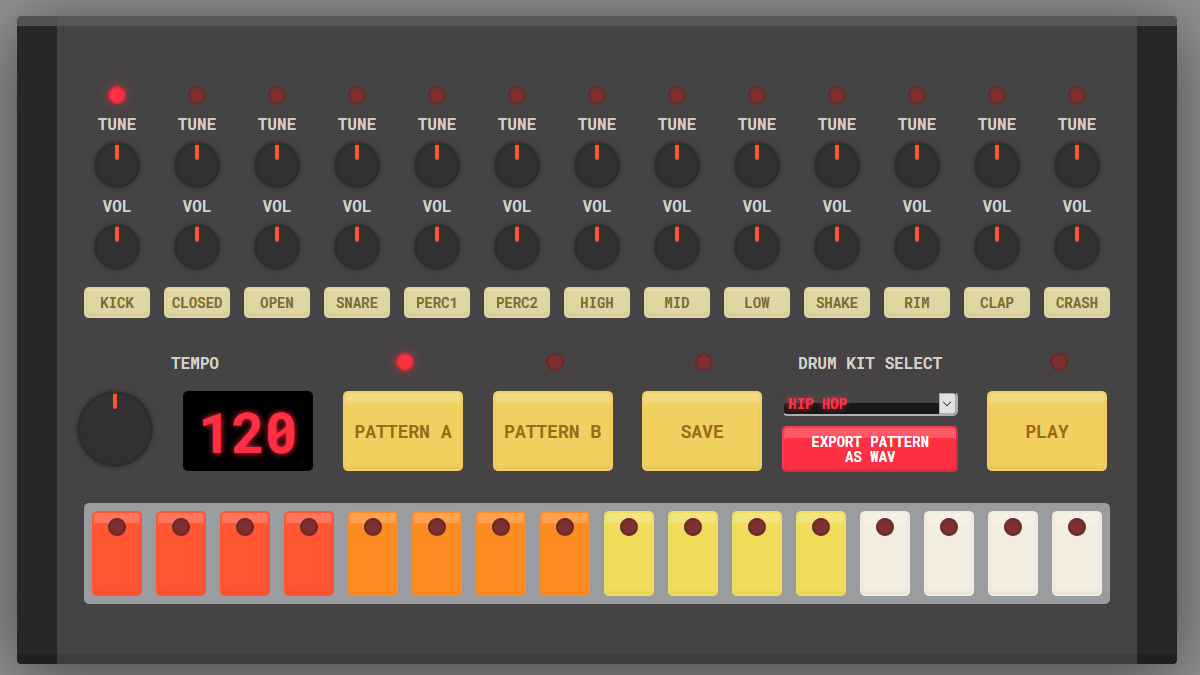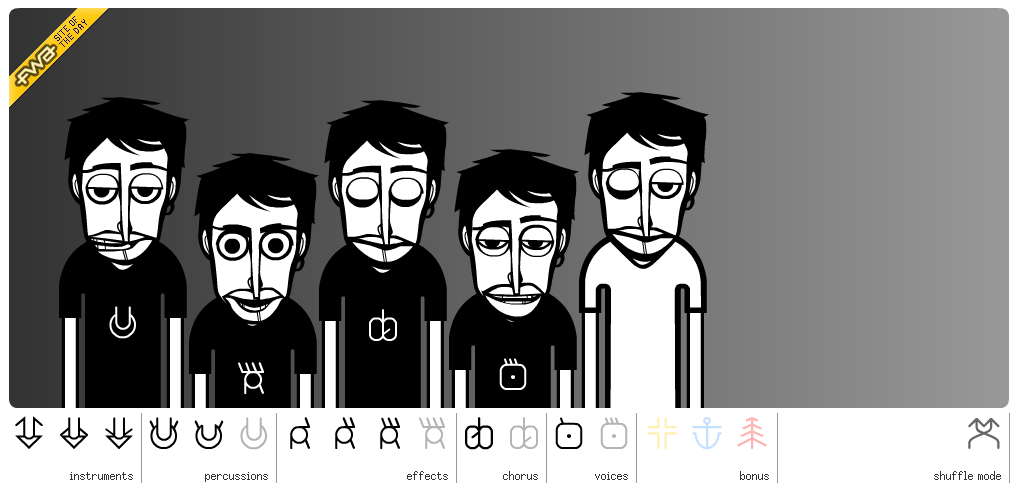Web Audio
Basics to Beats
Andrew Krawchyk
Senior Web Developer at ISL.
FEWD Instructor at General Assembly.
Not from Belgium.
Thomas Degry
Front end & iOS developer at ISL.
iOS instructor at General Assembly.
Originally from Belgium!
Luden's® Beatbox
ISL x Luden's®

(shameless plug™)
Inspiration

- Too abstract, not enough direction for the user.
- Too many controls, have to be a pro to master it.
- Easy to use, easy to master, lots of possibilities.
- Right amount of magic and easy to use.
- Too limiting, clunky UX.
Browser Support
IE doesn't support Web Audio.
- Chrome and Firefox report different duration times for the same audio file
- Edge's implementation is incomplete, no AudioContext.suspend()
- Loop `onend` only fires on some browsers
Inconsistencies across major browsers:
Syncing Sounds
Playing immediate sounds
Timing sound changes to be on beat
Playing looping sounds
Killing dead sounds
Technical Approach
React + Redux
Web Audio + SoundJS
React
Turns the lights on 🚦
Redux
Stores state and provides pub/sub to state changes
Updates the DOM based on those state changes
Provides selectors for computing derived data, keeps state management simple
Responds to actions by generating new state and emitting updates
Sends user actions to Redux
Receives state changes from Redux
Web Audio
Provides browser API for processing and synthesizing audio in web applications.
SoundJS
High resolution timer, microsecond precision for accurate scheduling.
Audio context consists of connected nodes creating an audio routing graph.
Simple API wrapping Web Audio, HTML tag, Flash, and even Cordova audio API's.
Plugins provide support, unfortunately still lowest common denominator problem.
Can't take advantage of advanced new features.
Application Structure
- Audio separated from React and Redux in helper
- Application has no knowledge about audioContexts or gain nodes
- Stateless changes like volume() and effect() exposed from the audio helper to React
- Playing state changes published through Redux and the audioHelper was subscribed and changed audio accordingly

Questions?
First, an Audio Context
const audioCtx = new AudioContext()
const masterGain = audioCtx.createGain()
masterGain.connect(audioCtx.destination)
masterGain.gain.value = 1
const mp3 = new Promise((resolve, reject) => {
fetch('https://s3.amazonaws.com/ludens-beta/1_Ludens_Rap.ef7f136e.mp3')
.then(res => {
// convert to array buffer
res.arrayBuffer().then(buffer => {
try {
// decode data
audioCtx.decodeAudioData(buffer, decodedData => {
resolve(decodedData)
})
} catch (error) {
reject(error)
}
}, error => {
reject(error)
})
})
})
mp3.then(decodedData => {
const source = audioCtx.createBufferSource()
source.buffer = decodedData
source.connect(masterGain)
source.start()
})Timing Sounds to Play on Beat
// assumes previous code
const sampleDuration = 16 // sec
function scheduleSound(when) {
const source = audioCtx.createBufferSource()
source.buffer = decodedData
source.connect(masterGain)
source.start(when)
}
scheduleSound(0)
scheduleSound(sampleDuration)
Playing looping sounds
Promise.all([
bufferLoader('https://s3.amazonaws.com/ludens-beta/3_Ludens_Bass_slap.904e2cae.mp3'),
bufferLoader('https://s3.amazonaws.com/ludens-beta/10_Ludens_groove_toypiano.93320ce2.mp3')
]).then(sounds => {
const scheduleAheadTime = 0.1 // sec
const sampleDuration = 16 // sec
let nextSoundTime = 0.0 // sec
let currentPlaying = sounds // current playing sounds
function nextSound() {
nextSoundTime = nextSoundTime += sampleDuration
}
function scheduleSounds(when) {
currentPlaying.forEach(decodedData => {
const source = audioCtx.createBufferSource()
source.buffer = decodedData
source.connect(masterGain)
source.start(when)
})
}
function scheduler() {
while (nextSoundTime < audioCtx.currentTime + scheduleAheadTime) {
scheduleSounds(nextSoundTime)
nextSound()
}
}
window.setInterval(() => {
scheduler()
}, 25) // lookahead ms
})Playing immediate sounds
// storage for raw audio buffers to be used with AudioBufferSourceNodes
const buffers = {}
// storage for current and future sources, arrays of sources keyed by buffer name
const liveSources = {}
function storeBuffer(name, buffer) {
buffers[name] = {}
buffers[name].buffer = buffer
}
// assumes previous code w/modifications
function scheduleImmediateSounds() {
// if we dont have current playing in live
// add new live source with offset
const newSounds = diffLiveAndPlaying(currentPlaying) // magic
let offset = sampleDuration - (nextSoundTime - audioCtx.currentTime)
return newSounds.forEach(name => {
playSoundSource(name, audioCtx.currentTime, offset)
})
}
function updateCurrentPlaying(update) {
currentPlaying = update
if (isScheduling) {
scheduleImmediateSounds()
}
}
updateCurrentPlaying(['rap', 'groove'])Killing dead sounds
// assumes previous code w/modifications
function pruneLiveSources() {
// if we have live sources not in currently playing
// kill those sources
const liveNames = Object.keys(liveSources)
const deadSources = liveNames.filter(name => currentPlaying.indexOf(name) === -1)
deadSources.forEach(removeLiveSource)
}
function nextSound() {
nextSoundTime = nextSoundTime += sampleDuration
pruneLiveSources()
iterations++
}
function updateCurrentPlaying(update) {
currentPlaying = update
if (isScheduling) {
pruneLiveSource(currentPlaying)
scheduleImmediateSounds()
}
}
updateCurrentPlaying(['rap', 'groove'])

